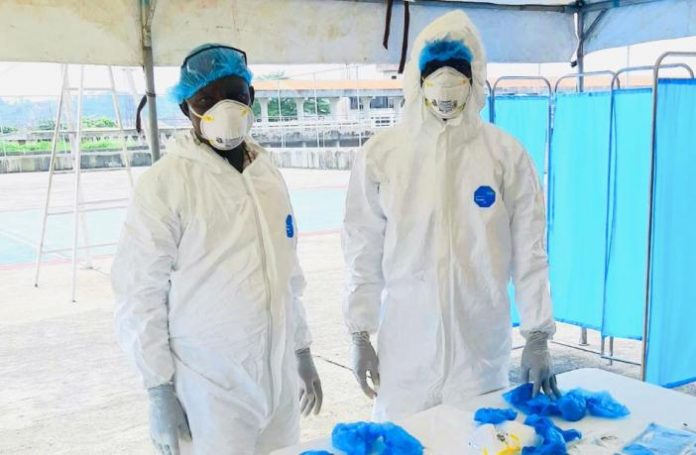The National Association of Resident Doctors will commence an indefinite nationwide strike action on Monday 15 June, except drastic action is taken by the federal government to meet their demands. The Association reached this decision at its general meeting on 29 May where it issued a 14-day ultimatum to the government.
In a 7 June NARD circular letter signed by Dr Aliyu Sakomba & Dr Bilqis Muhammad, president and secretary-general respectively, the resident doctors noted that there are subsisting demands which the federal government has failed to address for three years, as well as critical workplace safety issues related to the COVID-19 response.
The most important of the longstanding issues is the economic burden which resident doctors have to bear during their training. Budgetary allocations are not made to cover residency as an important element for producing specialist doctors.
This is even though there are laws which recognise the need to financially support resident doctors training programmes. What that means is that these doctors must pay for a lot of their academic needs from their pockets. This general situation, as the Association pointed out, is worse for resident doctors in the state tertiary health institutions “where the working conditions are mostly inhumane and hopeless”.
With poor working conditions, high cost of residency and poor salaries, resident doctors from poor working-class backgrounds are often forced to drop out of the time-bound programme. This helps to reinforce social and economic inequities.
The COVID-19 pandemic has further highlighted the risks associated with poor working conditions in the health sector. Personal protective equipment (PPE) are not adequate, both in terms of numbers available and in terms of specifications. And the hazard allowance of five thousand naira paid by governments is ridiculous.
Resident doctors do not enjoy death-in-service benefits as they are essentially in-training personnel. And doctors as well as other health workers do not have life insurance, despite the risks associated with their work, particularly in this era of epidemics, including Lassa fever and COVID-19.
Instead of improving employment, working conditions and remuneration of health (and other) workers, some state governments have been deducting from their salaries. Kaduna state is one of the more notorious states in this regard. In April, it unilaterally announced a 25% deduction of salaries of all public sector workers as contribution to a COVID-19 response fund.
Fourteen medical and health workers associations and unions immediately responded by constituting an ad-hoc Kaduna state Joint Health Workers Union which rejected this deduction. The 25% deduction was however made from the April salaries of all workers in the state, in violation of Section 5 of the Labour Act, as the unions pointed out.
The joint body then mobilised over 110,000 health workers of all cadres for a 7-day warning strike in May, calling for immediate reversal of the policy and repayment of what had been deducted. The Kaduna state government did all it could to break the workers resolve, describing any strike during the COVID-19 pandemic as naked blackmail.
The government’s resort to actual blackmail was to no avail. The warning strike was a huge success. But the Kaduna state government is yet to reverse the salary deduction policy and respond to the other demands of the health workers. These include; adequate provision of required personal protective equipment, enhanced workplace safety measures and payment of risk allowances to all health workers as against the biased selection of just a fraction of the health workforce, as is being currently done.
The workers have insisted on these demands and are mobilising for a full-scale strike if these are not met. In a communique signed by the chairpersons of all the health workers unions and associations in the state, after a meeting in the first week of June, they will commence an indefinite strike action if their demands are not met by 19 June.
The need for concerted nationwide efforts by all unions and associations in the health sector at this point in time cannot be overemphasized. Health facilities are understaffed, leaving health workers overworked. Their take-home pay is not at all commensurate with the work they do. And workplace safety is nothing to write home about.
The pandemic has brought the state of decay of the public health system to the fore, revealing the impact of years of underfunding, privatisation and public sector reforms which have led to outsourcing of several functions in the hospital. These led to health workers strikes in a few states (Enugu, Gombe, Ogun) & Abuja, in the early days of COVID-19 in the country.
Health workers need to stand as one to be stronger and with one voice demand; adequate funding of health services and training of medical and health professionals, safer health facilities supervised by Occupational Safety and Health committees which include both members of management and workers as union members, immediate stoppage of all forms of privatisation (including public-private partnerships) of health.
SWL fully supports NARD and calls for the Joint Health Sector Unions (JOHESU) to take up the gauntlet of building bridges with unions and associations (such as the NMA/NARD) that are not yet part of JOHESU. The lesson from the ad-hoc joint health sector union in Kaduna state is that we can be stronger when we all unions in the sector are united.
With the battles that lie ahead, we need to forge the widest possible unity, consolidate our collective our strength and mobilise rank and file members, starting from now. More states are likely to follow the pathway of Kaduna state and try to make workers bear the burden of economic crisis spurred by the pandemic. We must stop them in their tracks, with workers’ power.
by Muda OGIDAN









